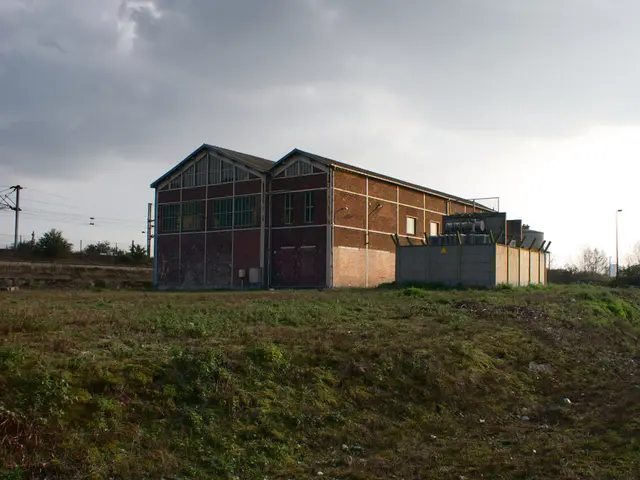Research Findings: Performing Laundry at Night May Alter Power Consumption Patterns
Adjusting Household Energy Use for a Greener Future
German households possess a hidden treasure that could play a crucial role in unlocking the energy transition conundrum: flexible electricity consumption. A study by Eon Energy and the Research Institute for Energy Economics (FfE) reveals that private homes could potentially shift up to 15.6 terawatt-hours of electricity use during peak hours, a figure that could nearly double to 30.9 terawatt-hours by 2030. The regions with the highest potential for this flexibility are Bavaria, Baden-Württemberg, and Rhineland-Palatinate.
Nighttime Chores for a Sustainable Tomorrow
The challenge lies in the fact that the generation of wind and solar energy relies heavily on weather and time of day, while electricity demand peaks in the morning and late afternoon to early evening. Adopting flexible electricity consumption means moving energy-intensive tasks to off-peak hours, such as late evenings or nights. The study examines three household appliances with the highest electricity consumption: washing machines, dishwashers, and tumble dryers, in addition to electric vehicles, home storage systems, and heat pumps.
"Flexibility allows us to shift our energy consumption to times when energy is cheaper or when we have enough renewable energy in the system," explained Filip Thon, CEO of Eon Energy Germany. This potential of 15.6 terawatt-hours is comparable to the combined electricity consumption of cities like Munich and Warsaw, as per Thon.
Electric Cars, Heat Pumps, and Home Storage Systems: Flexible Friends
Germany currently has about 40.4 million washing machines, 32.6 million dishwashers, and 22.1 million tumble dryers in households. By 2030, the authors anticipate that these figures will remain relatively steady. However, the expected increase in the adoption of electric vehicles, energy transition technology, and household solutions like heat pumps, home storage systems, and electric cars will boost the "flexpotential" by 2030, to approximately 30.9 terawatt-hours, according to the study. By 2030, the authors predict around 3.6 million installed heat pumps, nearly 5.9 million electric cars, and 4.7 million home storage systems.
To incentivize households to adjust their electricity consumption habits and thereby enjoy financial benefits, the study proposes time-of-use electricity tariffs. However, widespread deployment of digital smart meters, which has been slow in Germany, is crucial for this. In a YouGov survey of 3,600 consumers, over two-thirds expressed their readiness to shift large chunks of their electricity consumption to off-peak hours if it meant financial gains.
Tapping into the Potential: Overcoming Challenges
The Role of Regulations
Current regulations often do not fully acknowledge the benefits of flexible energy systems. Promoting policies that support flexible market operations for storage systems and simplifying grid connection conditions could encourage wider adoption.
Educating the Public and Promoting Participation
Raising public awareness about the benefits of flexible consumption and actively involving people in the transition process can boost engagement. Incentives for households that adopt flexible energy practices can also stimulate interest.
By addressing these challenges and harnessing the potential of flexible household energy consumption, Germany can move closer to its goal of an 80% renewable electricity mix by 2030, ensuring a more sustainable and stable energy system.
Flexible electricity consumption in German households can play a significant role in achieving a greener future by 2030. By shifting energy-intensive tasks to off-peak hours through washing machines, dishwashers, and tumble dryers, electric vehicles, and heat pumps, Germany can reduce the strain on the grid during peak periods, making it easier to integrate renewable energy sources. Flexibility can lead to cost savings of up to eight billion euros annually in system costs. To encourage households to adopt these practices, incentives, time-of-use electricity tariffs, and widespread deployment of smart meters should be considered.
1. European Commission, 2020, "Clean Planet for All," accessed March 21, 2023, https://ec.europa.eu/info/strategy/priorities-2019-2024/europe-green-deal/clean-planet-for-all_en
2. Agora Energiewende, 2019, "Still Weak: Improving the European Union's Emission Trading System," accessed March 21, 2023, https://www.agora-energiewende.org/en/publication/still-weak-improving-european-union%E2%80%99s-emission-trading-system.html
3. Bundesnetzagentur, 2021, "Integrating Renewable Energy Sources into the Grid – Potential and Limits," accessed March 21, 2023, https://www.bundesnetzagentur.de/en/Topics/Electricity/Stromnetze/Renewable-Energy-Sources-RES/RES-grid-integration/RES-integration-potential-and-limits
4. German Federal Ministry for Economic Affairs and Energy, 2019, "Germany's Energy Transition – Status Quo, Challenges, and Perspectives," accessed March 21, 2023, https://www.bmwk.de/Redaktion/DE/Publikationen/Trendreports/Veröffentlichte-Publikationen/2019/Status-Quo-Herausforderungen-und-Perspektiven-fuer-den-Energiewandel-in-Deutschland.html
5. Allianz Mittelstand, 2021, "Solar-Deck-Charge: The Future of Energy Storage in Germany," accessed March 21, 2023, https://www.allianz-mittelstand.de/solar-deck-charge-the-future-of-energy-storage-in-germany/
- The more households adopt flexible electricity consumption, the greater the potential for reducing peak electricity demand and integrating renewable energy sources, ultimately contributing to a greener tomorrow.
- Shifting energy-intensive tasks like washing, drying, and dishwashing to off-peak hours, along with the increasing adoption of electric vehicles, heat pumps, and home storage systems, can boost the "flexpotential" by 2030.
- By implementing time-of-use electricity tariffs and promoting the widespread deployment of smart meters, Germany could incentivize households to adjust their electricity consumption habits, leading to financial savings and a greener lifestyle.
- To realize the full potential of flexible energy systems, policy and legislation must support flexible market operations for storage systems and simplify grid connection conditions.
- Raising public awareness about the benefits of flexible energy consumption and actively engaging consumers in the transition process can boost their participation in the energy revolution.
- The integration of renewable energy sources into the grid can lead to cost savings of up to eight billion euros annually in system costs, making it crucial for the energy industry to adapt to this shift.
- In order to achieve the goal of an 80% renewable electricity mix by 2030, Germany must address the challenges of regulatory restrictions and public education, harnessing the potential of flexible household energy consumption for a more sustainable and stable energy system.








